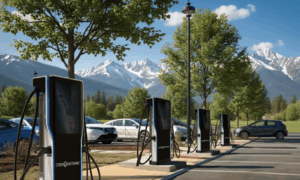
Home / EV Charging News / Electric Cars and Sustainable Supply Chains in Automotive Manufacturing
The automotive industry is undergoing a profound transformation with the rise of electric vehicles (EVs). This article delves into the intersection of electric cars and sustainable supply chains, exploring how the adoption of EVs is reshaping sustainability practices and revolutionizing supply chain logistics in the automotive manufacturing sector.
The surge in demand for electric vehicles represents a paradigm shift in the automotive landscape. With environmental consciousness on the rise, automakers are embracing electric cars as a key component of their portfolios. This shift not only affects the end product but reverberates throughout the entire supply chain.
The traditional automotive manufacturing process has been associated with significant environmental impacts, from raw material extraction to vehicle assembly. Electric cars are positioned as a more sustainable alternative, and this sustainability imperative is reshaping the entire supply chain ecosystem.
Electric vehicle batteries rely on materials such as lithium, cobalt, and rare earth elements. Sustainable material sourcing becomes a critical focus in ensuring that these components are ethically and responsibly extracted. Automotive manufacturers are actively seeking suppliers committed to environmental and social responsibility to minimize the ecological footprint of their supply chains.
Innovations in material science are driving the adoption of recyclable and biodegradable materials in electric car manufacturing. From interior components to body panels, automakers are exploring alternatives that reduce dependence on traditional, less sustainable materials, contributing to the circular economy within the industry.
Electric vehicle manufacturers are increasingly investing in energy-efficient production facilities. From solar panels to advanced energy management systems, these facilities aim to minimize the carbon footprint of the manufacturing process. The goal is not only to produce green vehicles but to do so in an environmentally responsible manner.
The shift towards sustainable supply chains involves minimizing waste and embracing circular economy practices. Automotive manufacturers are implementing initiatives to recycle production waste, repurpose materials, and design products with end-of-life recycling in mind. This holistic approach is integral to achieving a closed-loop, sustainable manufacturing ecosystem.
The transportation of components and finished vehicles is a significant aspect of supply chain logistics. Electric car manufacturers are opting for sustainable transportation modes, such as electric trucks and cargo ships with lower emissions. This step aligns with the overall sustainability goals of the electric vehicle industry.
To minimize the environmental impact of transportation, automotive manufacturers are localizing their supply chains. Reducing the distances components and vehicles travel helps cut down on emissions associated with long-distance transport. This trend towards localization enhances efficiency and sustainability in the supply chain.
The longevity and performance of electric vehicle batteries are crucial for sustainability. Ongoing research focuses on extending battery life, improving performance, and developing second-life applications for batteries that no longer meet vehicular demands. Maximizing the utility of batteries contributes to reducing waste and enhancing the sustainability of electric cars.
As electric vehicles become more widespread, responsible battery recycling programs are emerging. These programs ensure that end-of-life batteries are properly disposed of, and valuable materials are recovered for reuse. This focus on responsible recycling aligns with the principles of a sustainable supply chain in the electric car manufacturing sector.
The automotive industry is subject to stringent environmental regulations. Electric car manufacturers must comply with these regulations, driving the industry towards greener practices. Stricter emissions standards and environmental policies contribute to the continuous evolution of sustainability practices in the automotive supply chain.
Collaboration within the automotive industry is crucial for establishing and adhering to sustainability standards. Manufacturers, suppliers, and other stakeholders work together to set benchmarks for responsible sourcing, eco-friendly production, and sustainable logistics. This collaborative approach ensures a unified commitment to sustainability across the supply chain.
The evolution of battery technology plays a pivotal role in the sustainability of electric cars. Solid-state batteries, with their potential for higher energy density, longer lifespan, and reduced reliance on rare materials, represent a significant leap forward. Automotive manufacturers are investing in research and development to bring these advanced batteries to the market, further enhancing the eco-friendliness of electric vehicles.
Ongoing research focuses on finding sustainable alternatives to traditional battery materials. From exploring new cathode and anode materials to investigating more environmentally friendly electrolytes, the aim is to reduce the environmental impact of battery production. Sustainable battery materials are poised to become a cornerstone of green manufacturing in the electric car industry.
Digitalization and blockchain technology are being leveraged to enhance transparency in the supply chain. Blockchain ensures traceability and authenticity in the sourcing of materials, reducing the risk of unethical practices. This transparency extends to all stakeholders, fostering accountability and trust throughout the supply chain.
Real-time monitoring and data analytics are integral to optimizing supply chain efficiency. Electric car manufacturers are deploying advanced systems to track energy consumption, emissions, and logistical performance. This data-driven approach enables continuous improvement and informed decision-making, aligning with the principles of a sustainable supply chain.
The transition to electric car manufacturing involves overcoming challenges associated with existing infrastructure. Realigning production lines, retraining staff, and adapting to new manufacturing processes can be logistically complex. Automotive manufacturers are implementing phased strategies to ease the transition and minimize disruptions.
The proliferation of electric vehicles brings concerns about electronic waste. The responsible disposal and recycling of electronic components, particularly batteries, pose challenges. Industry stakeholders are actively developing comprehensive waste management programs to ensure the proper handling of end-of-life components, reducing the environmental impact.
Tesla stands out as a pioneer in sustainable electric car manufacturing. From its Gigafactories powered by renewable energy to its commitment to using recycled materials in vehicle production, Tesla exemplifies a holistic approach to sustainability. The company’s emphasis on vertical integration and innovative manufacturing processes sets a benchmark for the industry.
Volvo is actively implementing green supply chain initiatives to reduce its environmental footprint. The company aims to use recycled and sustainable materials in its vehicles, optimize energy efficiency in production, and collaborate with suppliers committed to eco-friendly practices. Volvo’s comprehensive sustainability strategy extends from sourcing to end-of-life considerations.
The concept of a circular economy, where products are designed for reuse, recycling, and remanufacturing, is gaining traction. Electric car manufacturers are increasingly embracing circular economy principles, designing vehicles with modular components that can be easily refurbished or repurposed, contributing to resource conservation.
The integration of artificial intelligence (AI) in manufacturing processes holds immense potential for sustainability. AI-driven systems can optimize energy consumption, predict maintenance needs, and enhance overall production efficiency. The smart utilization of AI aligns with the broader goal of reducing waste and minimizing environmental impact.
In conclusion, the convergence of electric cars and sustainable supply chains in automotive manufacturing represents a transformative journey towards a greener and more responsible industry. As advancements in technology, digitalization, and global collaboration continue, the vision of sustainable mobility is becoming a reality. The electric car sector is not just a driver of change in propulsion but a catalyst for a comprehensive shift towards ecological integrity, innovation, and a future where automotive manufacturing is synonymous with sustainability.



